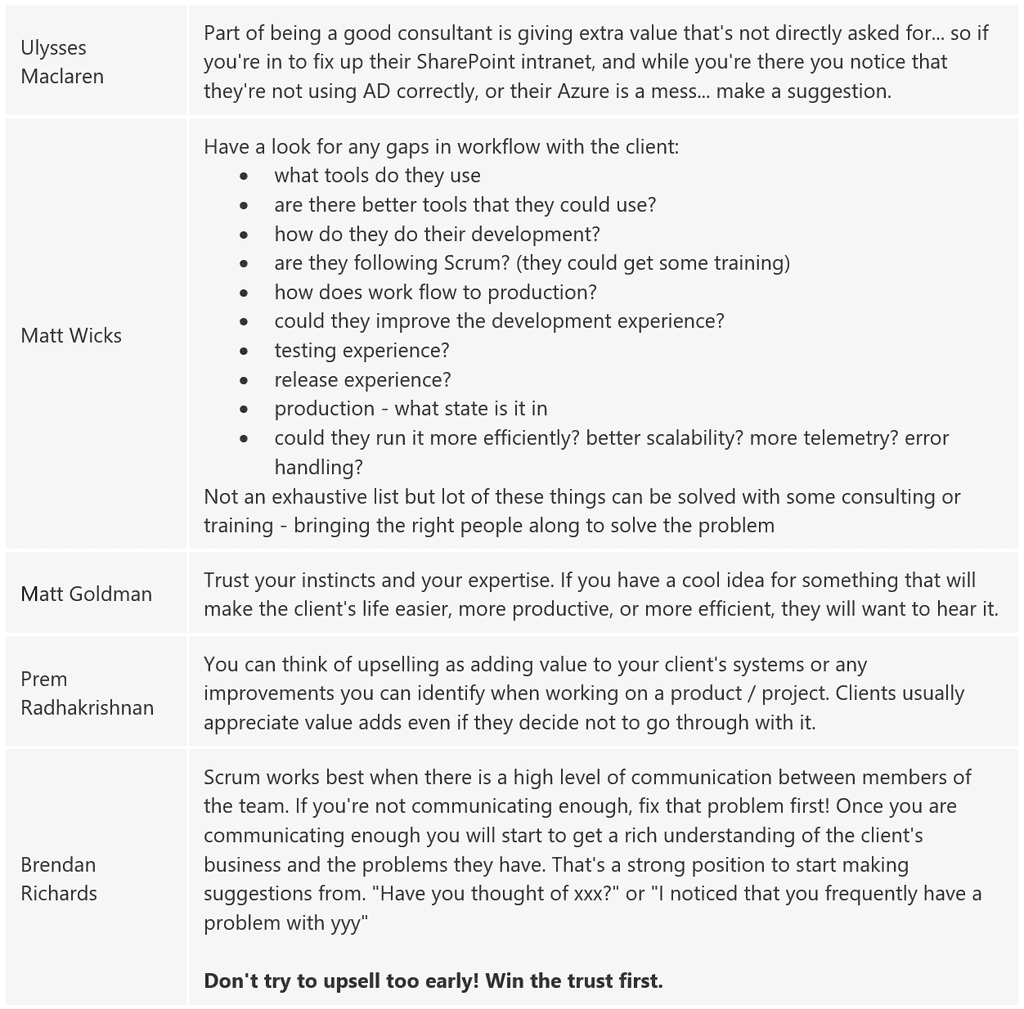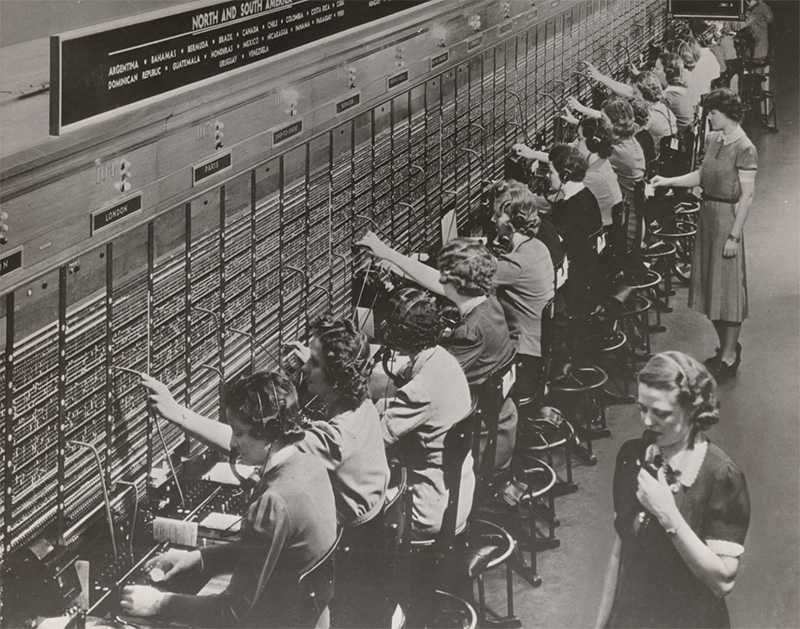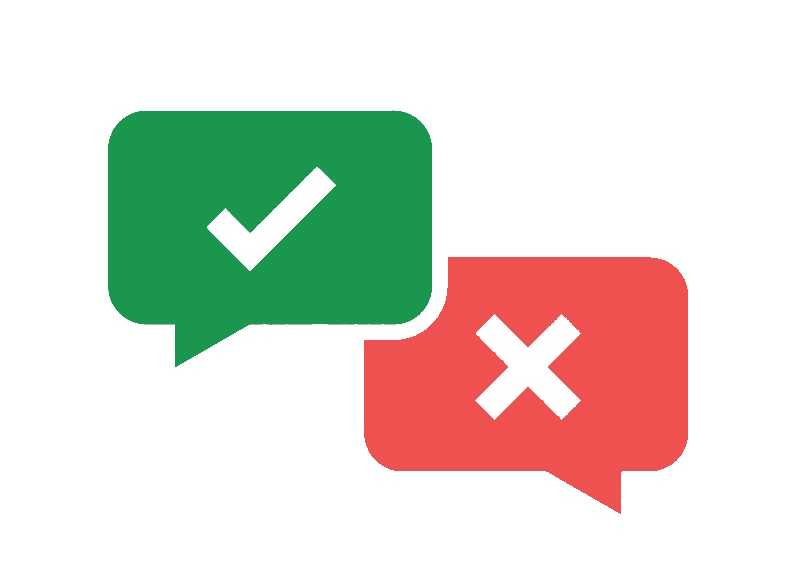Rules to Better Inbound Calls - 15 Rules
The way that your company answers phone calls is vitally important as it is often the first point of contact between your staff and potential clients. First impressions last and if the first impression starts off badly you've already got to make some extra ground to get back on par. Our initial phone conversations need to reaffirm the professional image that they have formed of SSW. Prospective clients may call 5 or 6 consultancies but only meet with 1 or 2 so we need to stand out. This starts with the very first phone call.
The benefits of a strong phone manner are such that clients retain positive perceptions of the service provided by the company and the staff that they interact with. Another great benefit of a proper phone etiquette is the chance to upsell, promote complimentary services or promote a better understanding between yourself and your customer. Here's a series of rules that detail some of the issues involved with maintaining a proper phone etiquette.
Do you agree with them all? Are we missing some? Let us know what you think.
First things first. You need to be able to list some of the main reasons why people may call you. When you know what some of these are it puts you in a better position to prepare yourself for action or an intelligent and helpful response. For example, if you're a restaurant you better have your reservation systems close to the phone and if you're a bank you better be ready for some abuse. At SSW we find that people call us for only a few reasons:
- For information about our consulting, products or events
- To speak to someone specific
- And not very often to complain
When you go to meetings to attract business, you always walk in knowing what they want. Why should phone calls be any different?
We use an inbound calls script. Having an inbound script does a couple of great things for you. It allows you to control the flow of the conversation, it also makes sure that you're asking them the right questions, and most importantly, you know when to listen and take notes. When someone calls always have an email open to jot down notes as well as a solid set of probing questions ready to ask the prospect.
If the call is regarding consulting these are the kinds of questions we ask:
- Can I get your name, company, phone number, and email?
- How did you find out about SSW?
- Do you have a website? If yes, what is the URL so I can look at it while we speak? (note the technology from the URL)
- Can I just ask, are you from a technical background?
- Have you given much thought to what you want your system to achieve (for example, we are currently doing an application that does...)?
- (Technical clients) Do you have a formal spec?
- (Technical clients) Have you chosen the technology - .NET, Web or Rich Client?
- Have you got an idea when you would like this project completed?
- What's your role in the project and how important is this project to your business?
- Do you have a bit of a ballpark of what you want to spend? (Silence). Are you thinking of 10k, 50k or 100k (Silence). (If they ask you for a ballpark, say: 'There are a number of factors involved, so it's too early for me to say at the moment, I will be in a much better position to work out a price once we've had a chance to meet and talk about your requirements.)
- Have you spoken to any other IT companies? Do you mind me asking who they were?
- Before we go, let me confirm my understanding of your requirements.
- Can I just explain to you how we move forward? We will have a free initial meeting with a developer and a Project Manager to get a thorough understanding of your requirements. At that meeting, we will also explain our development methodology and fees.
- Now, would you prefer to meet at our offices in Neutral Bay, or is it easier for you (First Name) if we come to you? (confirm date and time)
- Is there anyone else from your company who should be at that meeting? I'm just trying to understand how the decision to work with SSW would be made. (confirm you have the decision maker).
- Now get full details
If the call is regarding events these are the kinds of questions we ask:
- Which event are you interested in? The User Group, workshop, or conference?
- Would you like me to register your attendance for the event?
- What event information do you require?
How many times has another staff member given you a phone number to call back which was wrong? This should never happen.
This sounds like a bit of a no-brainer but as a simple rule, we say that you should always get the prospect's full contact details. These details should then be added to your company database (just in case that post-it note they wrote it on disappears).
Here are some of the important details that need to be recorded:
- Full name
- Company
- Position
- Phone number (work and mobile)
- Email address
- Company address
- How many employees does your company have? (This determines whether we go there or they come here.)
Ever wondered why 007 always introduced himself as "Bond, James Bond"? Well, If he introduced himself as just James everywhere he went you wouldn't think very much of this international man of espionage and danger would you? By using your full name it instantly gives you authority. It's also useful in situations where your name is common like Peter, John or Jane.
Just remember that first impression last so you need to make sure you're kind and courteous when you answer the phone and introduce yourself. An example of a good and positive welcome could be:
Stephen: SSW, Stephen Bennett speaking
Notice the use of the company name and your full name.
When you pick up the phone from someone who was on hold, you don't need to repeat the company name:
Stephen: Stephen Bennett speaking
When you speak to a salesperson and they're like UM...AH...ER... it doesn't instill a great deal of confidence in the offering. Phone conversations where people are mumbling and stumbling don't create a very positive impression. You should always aim to communicate your ideas and answer any questions that callers have promptly, clearly and effectively. If you speak with confidence, it will always inspire confidence in you and your company. Here are some general rules of thumb to follow for effective communication:
- Speak clearly, don't mumble
- Don't talk too quickly
- Don't eat or drink whilst on the phone - there's nothing worse than the sound of someone eating an apple on the other end
- Know how to vary your voice
- When you are talking about products and services you should be able to slow down and emphasize the important point
Getting the right information from prospects helps you prioritize potential leads and projects and won't have you running around unnecessarily after hot air.
High-gain questions allow you to get information that otherwise won't necessarily be provided. Important information isn't often volunteered by smart prospective clients.
First of all, you've got to ask because if you don't ask, you don't get. For example, "if everything in the proposal was ok, what date were you thinking of starting the project?" Such a simple question like that avoids spending priority time on clients who weren't thinking of starting the project until the next year!
If a client is reluctant to answer simple questions, a good way of eliciting a response is to provide options for them to choose. For example "if everything in the proposal was ok, would you kick this project off next week, or next month, or later in the year?", or "ok, so you don't have a set budget but what kind of ballpark were you thinking of, $25k, $150k or $300k?"
If you ask a prospect a question, you should patiently wait for the answer. If you jump in with an answer before they do you've saved them from having to answer the question themselves.
Giving your fellow employees informative messages is important. Follow these steps to make sure you are providing people with all the information they need to activate the message.
- Type the message directly into an email not a piece of paper even if it means putting the caller on hold for 15 seconds
- Ask for what it is with regard to
- Ask for the number
Subject: Phone message from John Smith
Adam,
John Smith called today at 11:20 am RE: Database consultation Contact Number: 03 9922 1100
Rebecca
How often has the connection dropped out while a call center operator was trying to transfer you, or perhaps you get put straight through to someone's voicemail, meaning you need to hang up and call again. You should have a simple method for transferring calls that ensures the caller doesn't go around in circles or is left waiting for ages, wondering what is going on.
- When a caller asks to be transferred say "Just putting you through" (Instead of "Hang on" which doesn't give the caller any indication of what is going on).
- IM e.g. Stephen: "Stephen, Colin from Microsoft Events, Line 1."
- Stephen responds "OK", and then pick up the call, following the rule above
- If Stephen doesn't respond or messages "Busy", Stephen is with a client or away from his desk. Then ask is there anything I can help you with? Take a message or try and assist the caller yourself
More on Rules to Better Instant Messenger.
Great consultants see opportunities and know that once they’re in at a client, they become a trusted advisor, and anything they say will have more weight than the same message coming from a Sales Person or an Account Manager.
Not all software developers are comfortable with “upselling,” but it is important to be on the lookout. There are 2 key scenarios:
- when you see an opportunity for upselling
- or when you come to the end of a booking period
Once a software developer sees an opportunity, they should have a corridor conversation and see if they get a positive bite from the customer. If they do then they should hand it over to the Account Manager to track in CRM (from there the client should be massaged until the new work is booked in).
1 - When selling a product, upsell your most valuable service
Most prospects come to your organization to seek a solution to a problem or need. By doing so, they place a certain amount of trust in you and your judgments. They trust a software developer can alleviate their problems, address their needs, and sometimes suggest an alternative plan of action.
Say you are talking to a customer having problems with a product e.g. Upsizing PRO! - if they are still having problems with upsizing to SQL Server, they probably need some help beyond what our program can provide. Therefore tell them about how SSW has upsized smoothly, so many databases for so many clients, and that we can help them. Though this example may not come across as an up-sell, little suggestions like these can bring in more consulting plus it shows that you're on the ball and looking out for your customers' needs.
Customers normally appreciate this sentiment. You need to remember that prospects don't always know exactly what they want or need and that's exactly why they've gone to the experts - YOU.

2 - Consultants should always be visible when they spot an upsell/cross-sell opportunity
When an Account Manager sells a solution to a customer, they are generally not trusted and have a bunch of competition.
When a developer sells the same solution to a customer they are generally trusted and have no competition - It is easier for a dev to upsell/cross-sell.
Upselling is when you go to McDonald's and ask for a soft drink and they say:
"Would you like a larger soft drink for only 20 cents more?"
Cross-selling is when you go to McDonald's and ask for a burger and they say:
"Would you like fries with that?"
This is the same as when a dev goes to a client to build an Angular application and they notice their dodgy excel reports and say:
"You really could do with a great reporting solution that could give you insights into your business. After this work, I could look at PowerBI for you. What do you think?"
Some developers see lots of opportunities for upselling, and once they get a positive bite from the customer they hand it over to the Account Manager to track in CRM. From there the client should be massaged until the new work booked in. This is important as Account Managers can then track and report on opportunities that have been won or lost.
Scenario: You overhear the client talking about implementing Azure AD. You do nothing and continue with your work.
Figure: Bad example - of upselling
Scenario: You are having an initial meeting with a client about developing a new in-house application. During this meeting, they mention a few additional projects to be completed. These include implementing syncing between their on-premises AD with Azure AD. You advise them that you have some SysAdmins that could assist in this work, and ask if it is ok for your account manager to call them.
Figure: Good example - of upselling
3 - Advice from trenches
From the above video, you can see that the software consultants at SSW completed a Microsoft Form with the question: Your advice: Pretend you are talking to a junior dev about this concept of upselling. What do you say to them? Here were some stand out answers:

Figure: Good ways to upsell Having a nice chat with clients is great but you should always finish the conversation with something to action. For example, if they wanted their requirements changed you should send them a confirmation email if they wanted to schedule a meeting you should send them an Outlook appointment. Here are some more examples of typical things you action after a call:
- Add contact details to the company database
- Pass the call to someone else
- Start work
- Remind yourself to follow up with another phone call
Nobody likes to hear they have an unhappy customer, but it happens. Maybe a deadline was missed, or a feature didn't work out as expected, or perhaps the client's just having a bad day. 🤬
When you get the call/email, how you respond can make or break the relationship. When handled correctly, complaints can turn into a positive outcome for both you and the client! 🎉
How to deal with complaints
- Don't take it personally, understand that most angry customers are not angry with you personally, but rather the situation in which they currently find themselves
- Stay relaxed, listen carefully, and acknowledge the concerns
-
Isolate the issues
If you need help with this, learn how to take feedback/criticism (even if it’s not your fault).
If solving the issue(s) is within your power, you should action it (or put a plan into motion) right away. But this may not always be the case - maybe you're a developer and the customer is upset about an invoice. In that case...
-
Conference in the appropriate resources. While you have the client on the call, don't let them go
OK, let's try and get this sorted right now. Is it OK with you if I bring in {{ RELEVANT PERSON }} to help work this out?
Figure: Good example - Bring in the people who can help resolve the problem right away.

Figure: Conference in another person to solve the problem - it's a lot easier than it used to be -
Follow up the proposed solution
E.g. "Bob, as per our conversation, Goldie will be on-site 9am tomorrow morning."
-
When the problem is finally solved, confirm so in writing, including the cause of the problem and what was done to fix it
E.g. "Bob, I'm glad Goldie was able to restore your application last night after the cleaners accidentally bumped the power cord on the server. Goldie plugged the power cable back in and fixed the error log. As discussed it would be a good idea to lock the server room. If there's anything else we can do to help - let me know."
Someone will complain about what you do no matter how 'perfect' you are. That doesn't matter. It's how you deal with the complaint that matters. It's important that every customer has a positive experience with your business and feels happy when they leave.
Remember: It's important to resolve a client's complaint because studies have shown that:
-
For every customer that complains, there may be 26 others that will not tell you they are dissatisfied. Of this 26:
- Up to 19 will not come back
- Most will tell 9 to 10 others
- At least 3 will tell more than 20 people
-
For every dissatisfied customer whose complaint you handle well:
- 95% will become loyal
- Most will recommend to 5 others
More on 50 Important Customer Experience Stats for Business Leaders.
Thus, by resolving a complaint efficiently and fairly, you will retain the customer's loyalty and potentially gain 5 new customers.
When we're speaking on the phone and taking down notes on your computer live is just a hell of a lot easier when you've got both of your hands-free so you can type away as you please. There's a simple solution - use headsets. With these not only can you type furiously with both hands but they're supposed to be a lot more ergonomically friendly.
Bluetooth headsets are preferred over direct audio input/output as they give you the freedom to move and can be connected to any device.
I absolutely hate being put on hold. When I call someone up to buy something and I get put on hold so that they can pick up another call, it amazes me how they are willing to jeopardize a hot prospect for an anonymous phone call. I think that when you have the momentum of the conversation going, the last thing you should do is put someone on hold to answer another call.
Of course, if you are the only one in the office, you should always pick up the other phone.
Being on hold is often a frustrating experience for most customers (yours truly included), so it's a really good idea to employ tactics so that time can fly by a bit quicker. A good way to do this is to keep the caller distracted with music or a message that they can listen to.
Every day businesses get hounded by sales calls; recruiters, cleaners, printer cartridges - the list goes on. When you receive a call for 'the manager' or 'for Tim', that sounds suspicious, ask the caller to provide the full name of the person they are seeking. If they can't, or don't provide a believable context, screen the call.
